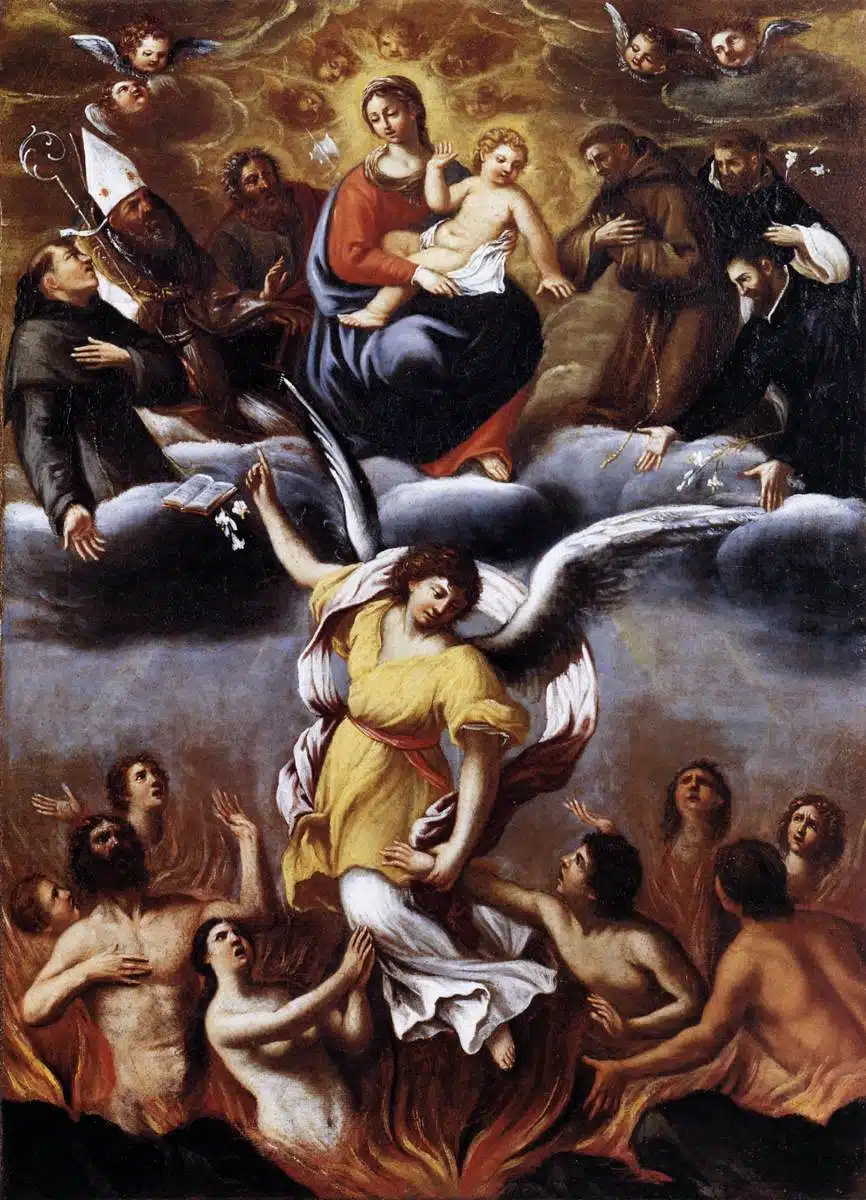Indulgences in the Catholic Church [1] are often misunderstood. Some may see them as an easy ticket to Heaven, an excuse to sin, or a transactional thing. But these are all incorrect.
When we sin, we must confess our sins to have the guilt erased from our souls. But even confessed sins, for justice’s sake, require reparation, whether on earth—through penance, prayer, or other good works—or in Purgatory. Indulgences decrease our temporal punishment for sins. This reparation is a wonderful opportunity for us to purge ourselves of sinful inclinations and to become purer and holier.
Indulgences [2] cannot be bought or sold (a sin known as “simony [3]”), and neither can they be obtained without sincerity and repentance.
Catholic Answers has a wonderful introduction to Catholic indulgences [4]:
To facilitate explanation, it may be well to state what an indulgence is not. It is not a permission to commit sin, nor a pardon of future sin; neither could be granted by any power. It is not the forgiveness of the guilt of sin; it supposes that the sin has already been forgiven. It is not an exemption from any law or duty, and much less from the obligation consequent on certain kinds of sin, e.g., restitution; on the contrary, it means a more complete payment of the debt which the sinner owes to God. It does not confer immunity from temptation or remove the possibility of subsequent lapses into sin. Least of all is an indulgence the purchase of a pardon which secures the buyer’s salvation or releases the soul of another from Purgatory. The absurdity of such notions must be obvious to any one who forms a correct idea of what the Catholic Church really teaches on this subject.
On the contrary, indulgences [4] are “…the extra-sacramental remission of the temporal punishment due, in God’s justice, to the sin that has been forgiven.”
There are two types of indulgences: plenary and partial. A plenary indulgence removes all temporal punishment due to sin, while a partial indulgence removes part of the temporal punishment.
How Do We Receive Indulgences?
There are many ways the faithful can receive indulgences. There are countless prayers that carry a partial indulgence, which can be found in The Enchiridion of Indulgences [5], a book comprised of indulgenced prayers and devotions. The Enchiridion is a wonderful starting point for gaining indulgences.
To receive indulgences [6], whether partial or plenary, the individual must be in good standing with the Catholic Church, and they must be in the state of grace at the time the indulgenced action is completed.
There are some requirements to receive a plenary indulgence [6]:
A plenary indulgence can be gained only once a day. In order to obtain it, the faithful must, in addition to being in the state of grace:
-have the interior disposition of complete detachment from sin, even venial sin;
-have sacramentally confessed their sins;
-receive the Holy Eucharist (it is certainly better to receive it while participating in Holy Mass, but for the indulgence only Holy Communion is required);
-pray for the intentions of the Supreme Pontiff.
It is appropriate, but not necessary, that the sacramental Confession and especially Holy Communion and the prayer for the Pope’s intentions take place on the same day that the indulgenced work is performed; but it is sufficient that these sacred rites and prayers be carried out within several days (about 20) before or after the indulgenced act. Prayer for the Pope’s intentions is left to the choice of the faithful, but an “Our Father” and a “Hail Mary” are suggested. One sacramental Confession suffices for several plenary indulgences, but a separate Holy Communion and a separate prayer for the Holy Father’s intentions are required for each plenary indulgence.
One should note, however, that these requirements do not apply to partial indulgences. And one should never shy away from attempting to gain a plenary indulgence, even if one cannot fulfill all of the requirements; for, even if all of the requirements for a plenary indulgence are not met (most often, the requirement of detachment from sin), one can always receive a partial indulgence in its place. God sees the effort and rewards it.
Additionally, one can also apply an indulgence to oneself or to the deceased [6] in Purgatory (a practice particularly appropriate for the month of November, the month of the holy souls [7]). However, we cannot apply indulgences to other living people.

As the Catechism of the Catholic Church states: “Since the faithful departed now being purified are also members of the same communion of saints, one way we can help them is to obtain indulgences for them, so that the temporal punishments due for their sins may be remitted” (CCC 1479 [8]).
It is important to note that many sources “count” indulgences [9] in terms of days or years, giving the impression that this meant one was earning 500 days out of purgatory, for instance. This is erroneous. Time does not exist in Purgatory in the sense we understand it. According to EWTN [9], the days or years counting “…meant instead the remission of temporal punishment analogous to a certain amount of penitence as practiced in the early Church.” This is difficult to ascertain, as the early Church had intense penitential practices. In recent decades, the Church instead has moved away from assigning time to penances, instead leaving the judgment of how much temporal punishment is removed by indulgences to God Himself and trusting in His mercy and love.
Examples of Indulgenced Prayers and Devotions
One can receive partial indulgences [10] from prayers as simple as a devout Sign of the Cross or Hail Mary, or short prayers such as [5] “May it please you, O Lord, to reward with eternal life all those who do good to us for your Name’s sake,” the Memorare, or Psalm 129, among many others.
Plenary indulgences can be gained in a variety of ways and on various feasts. The feast of the Divine Mercy [11], the Sunday after Easter, is a popular time for the faithful to gain indulgences. On this day, the faithful, under the usual conditions, can gain a plenary indulgence by going to a church or visiting the Blessed Sacrament and reciting an Our Father, Nicene Creed, and devout prayer to Jesus (such as “Merciful Jesus, I trust in You!”) and participating in the prayers in honor of the Divine Mercy.
For those who cannot make it to a church on Divine Mercy Sunday due to illness or other obstacles, the Church allows the faithful to gain a plenary indulgence by intending to make a confession, receive Communion, pray for the intentions of the Pope, and praying an Our Father and Nicene Creed before an image of Christ (most appropriately, the Divine Mercy image), as well as saying a devout prayer to Christ, such as the “Merciful Jesus” prayer discussed above.
According to the Catholic News Agency [11]: “For those faithful who cannot fulfill those obligations either, it is still possible to earn a plenary indulgence. If “with a spiritual intention” people unite themselves to all the faithful hoping to obtain the indulgence through the prescribed prayers, and they offer a prayer and their sufferings to Christ, then they are able to obtain the plenary indulgence. They also must intend to go to confession, receive Communion, and pray for the pope as soon as possible.”
And of course, one can always receive a partial indulgence on Divine Mercy Sunday, such as through “a legitimately approved invocation” with contrition.
Another popular way to gain a plenary indulgence is through praying the Rosary in a group or before the Blessed Sacrament. Here, you can find the particular requirements for a Rosary indulgence [12].
2025 is also a Jubilee Year [13], meaning that Catholics can, under the usual conditions, gain plenary indulgences through pilgrimages, prayerful visits to certain churches, or performing the Works of Mercy [14].
We Do Not Gain Our Salvation Alone
In earning indulgences, it is important to remember that we do not get to Heaven alone, but only with the grace, mercy, and assistance of a loving and merciful Father, Who deeply desires our salvation. Without Him, it is impossible to save our souls. We should be careful not to become too focused on ourselves and our own works, to see the spiritual life as a transactional thing, become scrupulous, or view God as a sort of “vending machine,” where if we only press the right “buttons”, we will get to Heaven.
Instead, we should always remember that indulgences, first and foremost, come from God. They are gifts given to the Church, through which He dispenses grace. It is only from Him that we gain indulgences (or any other spiritual benefit), forgiveness of our sins, and increases in holiness. They are evidence of God’s mercy and desire for our salvation, and only one of a multitude of ways that one can grow in holiness.
Nevertheless, we should never stop performing penances, praying, fasting, and frequenting the Sacraments for our souls and for the souls of others.

Purgatory is Evidence of God’s Love
While many Catholics fear and dread Purgatory and believe that most everyone who goes to Heaven will have to first pass through it, St. Therese of Lisieux had a daring view [15] of Purgatory. She believed that Purgatory was meant to be the exception, rather than the rule. She believed that God, Who is our loving Father, hesitantly passes out this punishment, which is meant to purify us so we are ready for Heaven. St. Therese believed that one can avoid Purgatory by simply trusting in God, loving Him, and allowing Him to purify one perfectly on Earth.
St. Therese boldly proclaimed [16]:
You do not have enough trust. You have too much fear before the good God. I can assure you that He is grieved over this. You should not fear Purgatory because of the suffering there, but should instead ask that you not deserve to go there in order to please God, Who so reluctantly imposes this punishment. As soon as you try to please Him in everything and have an unshakable trust He purifies you every moment in His love and He lets no sin remain. And then you can be sure that you will not have to go to Purgatory.
What wondrous trust in our merciful Father! As we seek to gain indulgences, let us not forget the great love of God, how much He desires our salvation, and how He will always be ready to assist us.
We should also remember the words from the Catechism [8]:
The Christian who seeks to purify himself of his sin and to become holy with the help of God’s grace is not alone. ‘The life of each of God’s children is joined in Christ and through Christ in a wonderful way to the life of all the other Christian brethren in the supernatural unity of the Mystical Body of Christ, as in a single mystical person.’
In the communion of saints, ‘a perennial link of charity exists between the faithful who have already reached their heavenly home, those who are expiating their sins in purgatory and those who are still pilgrims on earth. between them there is, too, an abundant exchange of all good things.’ In this wonderful exchange, the holiness of one profits others, well beyond the harm that the sin of one could cause others. Thus recourse to the communion of saints lets the contrite sinner be more promptly and efficaciously purified of the punishments for sin (CCC 1474-5 [8]).